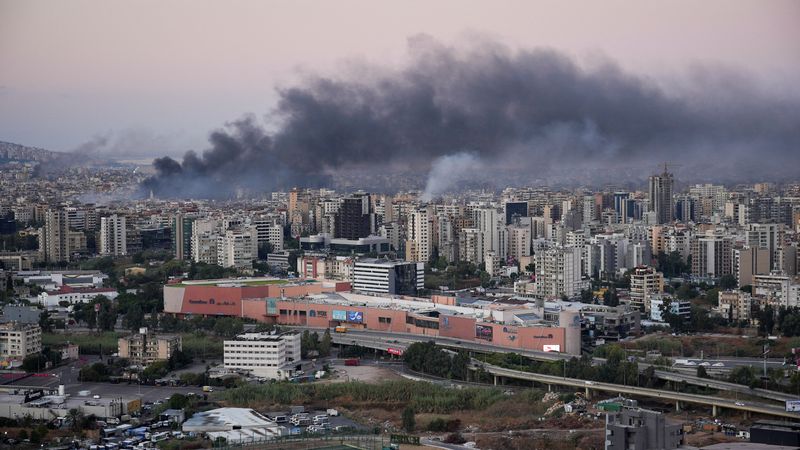By Dhara Ranasinghe and Alun John
LONDON (Reuters) – Conflict in the Middle East is escalating once more, but the mood music across financial markets remains upbeat for now due to shifts in oil production and as global interest rate cuts eclipse geopolitics.
Israel, still battling Hamas in Gaza, bombed Beirut on Thursday as it continued its conflict with Lebanese group Hezbollah days after being attacked by Iran.
Yet MSCI’s world stock index is just 1% off last week’s record highs and oil prices, which rose around 5% in the 24 hours after Iran’s missile attack on Israel, have steadied around a far from threatening $75 dollars a barrel.
Certainly, a bigger escalation that disrupts supplies of oil from the Middle East and shakes the global economy would invoke a bigger reaction, and the fact that stock markets are near record highs could make them vulnerable to sharp falls.
But for now markets are cushioned by the prospect of more monetary easing and by the United States’ expanded role in oil production, which has offset the Middle East’s dominance.
Wall Street’s so-called fear gauge, the VIX volatility index, is at a moderate level around 20 – well below a post-pandemic peak above 60 hit during market turmoil in early August linked to an unwind in global carry trades.
“When we think about geopolitical risk and its transmission into asset prices, what will obviously have a bigger impact is if we see outcomes that materially impact growth or inflation,” said Mark Dowding, BlueBay Asset Management’s chief investment officer.
“The main concern really has been through a transmission impact on oil prices. But even here, we’ve been in a situation where, if anything that the oil price had been sliding.”
The United States becoming a big oil producer – the world’s biggest for the past six years – has reduced global sensitivity to Middle East supply disruptions, analysts say.
And European energy markets have reorganised themselves since Russia’s invasion of Ukraine, which was a dramatic example of how an energy price surge can roil global markets and economies.
“The growing importance of the U.S. would suggest that risks to energy supply from rising tensions in the Middle East are somewhat mitigated,” said Katharine Neiss, chief European economist at PGIM Fixed Income.
DIFFERENT TIMES
In 2022, when Russia invaded Ukraine, oil prices surged above $100 and gas prices soared, unleashing a fresh wave of inflation that piled pressure on central banks to hike interest rates, driving bond yields higher, especially in the U.S. and, in turn, boosting the dollar.
The situation today is different. Central banks are already in easing mode and hopeful the U.S. will avoid recession.
The world economy is not primed for an oil shock, said Trevor Greetham, Royal London Asset Management head of multi asset, because it is at a “softer stage of the cycle.”
That contrasts with 2022, “when Ukraine happened, you were already in that period where you were just starting to get very high inflation numbers,” Greetham said.
The current backdrop of easier monetary policy supports investor sentiment, even as tensions in the Middle East rise.
Tilmann Kolb, emerging markets strategist at UBS Global Wealth Management, said that while the past two years had seen significant developments in domestic and international politics, for markets, the economic outlook remained key.
“Where is inflation going? How is the Fed responding? Is growth holding up?,” he said.
Meanwhile, investors have jumped on announcements of long-awaited economic stimulus measures from China that have sent Chinese shares surging, and boosted global assets from luxury stocks to industrial metals and miners.
“The impact of China delivering a big policy stimulus last week was almost a more significant factor in terms of what it means for global demand and growth,” said BlueBay’s Dowding.
RISK ON TO RISK OFF
Of course, the dial could swing very quickly and oil itself remains the transmission mechanism if geopolitics flare further.
Tina Fordham, founder and geopolitical strategist at Fordham Global Foresight, said she was watching to see if Israel would target either Iran’s energy infrastructure or nuclear facility.
“Either of those targets would result in a market impact,” she said.
“Where this could get more problematic is, for example, if Ukraine targets Russian energy infrastructure at the same time.”
And with stock markets near record highs, there is scope for dramatic tumbles, policymakers warn.
The Bank of England said on Wednesday that global asset prices remain stretched and are vulnerable to a big fall as investors grow more concerned about geopolitical risks.
And for Andrew Bresler, CEO at Saxo UK, assets are mispriced given geopolitical risks, adding that volatility indicators such as the VIX should be higher.
“It’s a little bit alarming to me how desensitised markets are to geopolitical risks,” he said.

